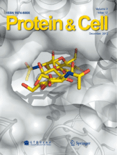
MOLECULAR BIOLOGY
metrics 2024
Unlocking the Secrets of Life at the Molecular Level
Introduction
MOLECULAR BIOLOGY, published by PLEIADES PUBLISHING INC, serves as a vital repository for the dissemination of innovative research within the fields of biochemistry, genetics, and molecular biology. With an ISSN of 0026-8933 and an E-ISSN of 1608-3245, this journal has been a mainstay in the scientific community since its inception, embracing its deep historical roots from 1971 to the present. Recognized for its qualitative contributions, MOLECULAR BIOLOGY is ranked in the Q3 quartile for Biophysics and Q4 for Structural Biology, placing it among select journals in its domain. Researchers and students alike benefit from its rigorous peer-reviewed articles, which focus on all aspects of molecular mechanisms and interactions. The journal's inclusion in prestigious databases underlines its commitment to academic excellence. The editorial board is dedicated to fostering the sharing of influential findings, making it an essential resource for advancing knowledge and innovation in molecular biology.
Metrics 2024
 0.30
0.30 1.50
1.50 1.20
1.20 29
29Metrics History
Rank 2024
Scopus
IF (Web Of Science)
JCI (Web Of Science)
Quartile History
Similar Journals

Protein & Cell
Unveiling Innovations in Drug Discovery and BiotechnologyProtein & Cell, published by Oxford University Press, is a distinguished international journal focusing on cutting-edge research in the fields of biochemistry, biotechnology, cell biology, and drug discovery. This open access journal, active since 2014, is dedicated to disseminating innovative findings that advance our understanding of protein functions and cellular processes, making it an essential resource for researchers, professionals, and students alike. With an impressive 2023 impact factor reflected in its Q1 ranking across multiple categories such as Biochemistry, Drug Discovery, and Cell Biology, 'Protein & Cell' stands at the forefront of scientific research, driving collaboration and discussion in the scientific community. Researchers can access the journal freely online, fostering a global exchange of knowledge and contributing to significant advancements in medicine and biotechnology. Located in the United Kingdom, the journal strives to be a pivotal platform for impactful research that influences future studies and applications.

BIOCHEMICAL AND BIOPHYSICAL RESEARCH COMMUNICATIONS
Fostering innovation in biochemical and biophysical research.BIOCHEMICAL AND BIOPHYSICAL RESEARCH COMMUNICATIONS, published by Academic Press Inc Elsevier Science, stands as a leading periodical in the fields of biochemistry, biophysics, cell biology, and molecular biology. With an ISSN of 0006-291X and an E-ISSN of 1090-2104, this esteemed journal has been a pivotal platform for the dissemination of groundbreaking research since its inception in 1959, continuing to publish influential findings through at least 2024. It holds a commendable Q2 ranking in Biochemistry and Q1 status in Biophysics as of 2023, reflecting its high impact and relevance in the field, supported by its strong Scopus rankings—ranking #43 in Biophysics and maintaining a presence in the top quartiles of several related categories. Although it is not an open-access journal, it provides critical insights and essential data that cater to researchers, professionals, and students keen on advancing their understanding of complex biochemical and biophysical processes. Its significant contributions to the scientific community underscore the importance of this journal as a reference point for innovative research and collaborative discourse.

INTERNATIONAL JOURNAL OF BIOCHEMISTRY & CELL BIOLOGY
Shaping the Future of Biochemistry and Cell BiologyThe International Journal of Biochemistry & Cell Biology, published by Pergamon-Elsevier Science Ltd, stands as a pivotal resource in the fields of biochemistry and cell biology. With an ISSN of 1357-2725 and an E-ISSN of 1878-5875, this prestigious journal has been a key platform for disseminating cutting-edge research since its inception in 1995. The journal currently holds an impressive Q1 ranking in Biochemistry and a Q2 ranking in Cell Biology for the year 2023, reflecting its commitment to high-quality research and its influence within the scientific community. With a significant Scopus ranking of 94/438 in Biochemistry and 96/285 in Cell Biology, the journal plays a crucial role in advancing knowledge and fostering innovative approaches in these dynamic fields. Though it is not an open-access journal, the International Journal of Biochemistry & Cell Biology remains accessible to a wide audience, making it a vital resource for researchers, professionals, and students alike, who are eager to explore and contribute to the ongoing advancements in biochemistry and cell biology.

Cold Spring Harbor Perspectives in Biology
Advancing Biological Insights for Tomorrow's InnovatorsCold Spring Harbor Perspectives in Biology is a prestigious academic journal published by COLD SPRING HARBOR LAB PRESS that serves as a vital resource in the fields of Biochemistry, Genetics, and Molecular Biology. With an impressive impact factor and categorized in the Q1 quartile for its contributions, this journal is renowned for curating comprehensive reviews that synthesize the latest advancements and ongoing research in these dynamic and interconnected disciplines. Since its inception in 2009, the journal has played a pivotal role in advancing scientific knowledge through high-quality articles that cater to researchers, professionals, and students alike. Although it operates on a traditional subscription model, its contributions are indispensable for those seeking to remain at the forefront of biological research and its myriad applications. With a commendable ranking of #19 out of 221 in general biochemistry, genetics, and molecular biology on Scopus, this journal ensures that its readers have access to cutting-edge insights and a rigorous academic discourse.

FEBS LETTERS
Igniting Passion for Molecular and Cellular ResearchFEBS LETTERS, published by Wiley, is a prestigious journal that has firmly established its place in the fields of biochemistry, biophysics, genetics, molecular biology, cell biology, and structural biology. With an esteemed history dating back to 1968, this journal continues to be a vital resource for researchers and professionals involved in the biological sciences. It boasts impressive quartile rankings, including Q1 statuses in several categories such as Biochemistry and Genetics, reflecting its high impact factor and significant contribution to scientific discourse. FEBS LETTERS provides a platform for innovative findings and critical reviews, fostering the exchange of knowledge and ideas within the scientific community. Although it operates under a subscription model, the journal ensures broad dissemination of groundbreaking research through its rigorous peer-review process. The vibrant discussions encouraged by articles published in FEBS LETTERS aim to inspire current and future generations of scientists to push the boundaries of biological understanding, making it an indispensable resource for anyone dedicated to advancing their knowledge in these dynamic fields.

TRENDS IN BIOCHEMICAL SCIENCES
Exploring the Frontiers of Biochemical InnovationTRENDS IN BIOCHEMICAL SCIENCES is a premier academic journal published by CELL PRESS, focusing on the latest advancements and insights in the dynamic fields of biochemistry and molecular biology. With an ISSN of 0968-0004 and an E-ISSN of 1362-4326, this journal has established itself as a leading source of high-impact research, boasting an impressive Q1 category ranking in both Biochemistry and Molecular Biology as of 2023. The journal's Scopus Ranks further highlight its significance, placing it in the top 3% and 4% of its respective fields, emphasizing its role as a vital platform for disseminating innovative research. Published since 1976 and continuing through 2024, TRENDS IN BIOCHEMICAL SCIENCES provides a comprehensive overview of the latest trends, methods, and applications, helping researchers, professionals, and students stay at the forefront of their disciplines. Although it offers traditional access options, the journal's rich content and authoritative analysis make it a must-read for those pursuing cutting-edge biochemical research.

PROTEIN SCIENCE
Championing Excellence in Protein Science ScholarshipPROTEIN SCIENCE, published by Wiley, is a premier journal dedicated to the field of biochemistry, molecular biology, and medicine, boasting an impressive impact factor that reflects its influence and importance within the academic community. Established in 1992, the journal has continuously provided a platform for high-quality research, with a current classification in the top quartile (Q1) for its critical contributions to the understanding of protein structure and function, as well as its applications in health and disease. With a Scopus ranking placing it in the 91st percentile among its peers, PROTEIN SCIENCE publishes cutting-edge studies and reviews that are essential for researchers, professionals, and students seeking to advance their knowledge in protein research. Although it does not currently offer open access options, the journal remains dedicated to disseminating vital findings that support the ongoing advancements in molecular biology and biochemistry. Researchers can count on PROTEIN SCIENCE for consistently rigorous peer-reviewed content that fosters meaningful dialog and innovation in the life sciences.

BIOCHIMICA ET BIOPHYSICA ACTA-MOLECULAR CELL RESEARCH
Connecting researchers with breakthrough insights.BIOCHIMICA ET BIOPHYSICA ACTA-MOLECULAR CELL RESEARCH is a premier journal published by Elsevier, dedicated to advancing the fields of cell biology and molecular biology. Established in 1982, this influential journal has been at the forefront of scientific research and innovation, currently holding esteemed positions with a Q2 ranking in Cell Biology and a Q1 ranking in Molecular Biology for 2023, reflecting its commitment to high-quality scholarship. With an impressive impact factor, it ranks in the 82nd and 78th percentiles for Molecular Biology and Cell Biology, respectively, amongst its peers. Researchers, professionals, and students will find this journal to be an invaluable resource for exploring the latest discoveries and methodologies in the molecular mechanisms underlying cellular functions. Although it is not an open-access journal, the insights offered in its pages contribute significantly to the scientific community's understanding of cellular and molecular processes, ensuring it remains a vital platform for disseminating cutting-edge research.

JOURNAL OF BIOLOGICAL CHEMISTRY
Shaping the Future of Biological SciencesJOURNAL OF BIOLOGICAL CHEMISTRY, published by Elsevier, is a premier interdisciplinary journal dedicated to advancing our understanding of biochemistry, cell biology, and molecular biology. With a prestigious history dating back to 1945 and an impressive convergence of research expected to continue through 2024, this journal holds a Q1 ranking in all three of its core categories, signaling its critical influence in the respective fields, supported by a robust Scopus ranking that places it among the top echelons of internationally recognized research. Although currently not available as Open Access, the journal is essential for researchers and professionals looking to stay abreast of the latest breakthroughs and innovations in biochemical research. With a deep commitment to scientific rigor and a focus on diverse topics ranging from cellular processes to molecular mechanisms, the Journal of Biological Chemistry serves as a vital resource for the academic community, shaping the future of biological sciences.

CURRENT PROTEIN & PEPTIDE SCIENCE
Navigating the Evolving Landscape of Protein and Peptide ScienceCURRENT PROTEIN & PEPTIDE SCIENCE, published by Bentham Science Publishers, is a pivotal journal dedicated to the dynamic and rapidly evolving fields of protein and peptide research. With an ISSN of 1389-2037 and an E-ISSN of 1875-5550, this esteemed journal serves as a platform for disseminating cutting-edge findings from various disciplines, including biochemistry, cell biology, and molecular biology. Recognized for its influence with a 2023 Scopus ranking placing it within the top quartiles of its categories—Q3 in Biochemistry, Q4 in Cell Biology, and Q2 in Medicine—the journal not only enhances the visibility of critical research but also supports the academic community in advancing our understanding of the molecular foundations of life. Established in 2000 and running through 2024, CURRENT PROTEIN & PEPTIDE SCIENCE is positioned to cater to the interests of researchers, professionals, and students alike, providing them with open access to vital knowledge that fuels innovation and scientific inquiry in the United Arab Emirates and beyond.